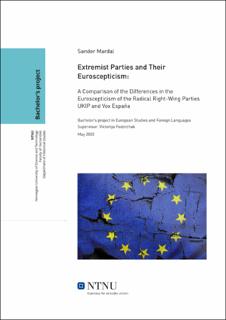| dc.contributor.advisor | Fedorchak, Viktoriya | |
| dc.contributor.author | Mardal, Sander | |
| dc.date.accessioned | 2021-09-13T16:02:38Z | |
| dc.date.available | 2021-09-13T16:02:38Z | |
| dc.date.issued | 2020 | |
| dc.identifier | no.ntnu:inspera:57494640:26701122 | |
| dc.identifier.uri | https://hdl.handle.net/11250/2775520 | |
| dc.description.abstract | Som følge av akselerasjonen av den europeiske integrasjonsprosessen på slutten av 1990-tallet og starten på 2000-tallet har det vært en økning av politiske partier som ytrer sin skeptisisme eller kritikk mot integrasjonsprosessen. Ved å bruke en typologi presentert av Sofia Vasilopoulou, undersøker denne oppgaven forskjellene i euroskeptisismen blant to radikale høyrepartier i Storbritannia og Spania: UKIP og Vox España. Det første kapittelet inneholder en kort introduksjon og gir rede for problemstillingen. I det andre kapittelet forklares den gjeldende litteraturen som eksisterer når det kommer til euroskeptisisme og de to partiene. Deretter, ved å analysere partiprogrammer og taler fremført av representanter for partiene, ble partiene analysert basert på fire forskjellige aspekter. Den felles kulturarven, prinsippet for Europeisk integrasjon, nåværende praksis og fremtiden for Europeisk integrasjon. Som følge av dette, ble partiene kategorisert i en av de tre følgende kategoriene: "Avvisende", "betinget" eller "stridende" euroskeptisisme. Oppgaven konkluderer med at euroskeptisismen blant radikale høyrepartier er svært forskjellig, og UKIP ble kategorisert som "avvisende" euroskeptikere og Vox España ble kategorisert som "betinget" Euroskeptikere. De to partiene har noen felles interesser og preferanser, men det blir klart at de to partiene har veldig forskjellige syn på europeisk integrasjon, der UKIP ønsker å forlate EU helt mens Vox España ønsker å reformere den nåværende politikken fra innsiden. Å være klar over disse forskjellene vil være nyttig dersom man ønsker å forklare samarbeidsmønstre mellom politiske partier på det europeiske nivået, eller undersøke om euroskeptisismen til et parti er basert på ideologiske eller strategiske insentiv. | |
| dc.description.abstract | Following the acceleration of the European integration process in the late 1990s and early 2000s, there has been a rise in political parties expressing their scepticism or outright criticism of the integration process. Using a typology presented by Sofia Vasilopoulou, this thesis investigates the differences in the Euroscepticism of two radical right-wing parties in The United Kingdom and Spain: UKIP and Vox España. The first chapter of the thesis gives a brief introduction and presents the research question. The second chapter gives an overview of the current state of art on the literature on Euroscepticism and the two parties. Following this, by thoroughly analysing party manifestos and speeches made by party representatives, the parties were analysed on four different aspects: the common cultural heritage, the principle of integration, the current practice of the EU and the future of European integration, before they were placed into one of the three categories: “rejecting”, “conditional” and “compromising” Euroscepticism. The conclusion is that Euroscepticism within radical right-wing parties is very different, as UKIP was categorized as “rejecting” Eurosceptics and Vox España was categorized as “conditional” Eurosceptics. The parties were shown to have some common interests, but it becomes clear that the two parties have very different views on European integration, as UKIP wants to totally abandon the EU, while Vox España wants to reform the current practices from within. Being aware of these differences is therefore useful in explaining patterns of cooperation between these parties on a European level or investigate whether the Euroscepticism is based on ideological or strategical motivations. | |
| dc.language | | |
| dc.publisher | NTNU | |
| dc.title | Extremist Parties and Their Euroscepticism: A comparison of the Differences in the Euroscepticism of the Radical Right-Wing Parties UKIP and Vox España | |
| dc.type | Bachelor thesis | |
